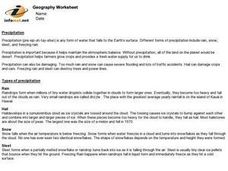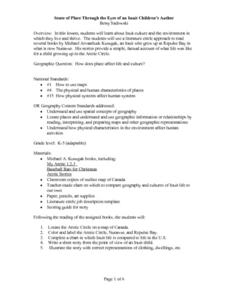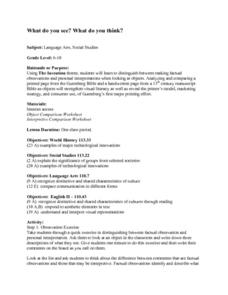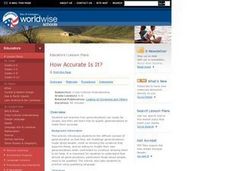Curated OER
Precipitation
Fourth graders identify the conditions that create rain. They read and discuss weather records, and write a news article that includes factual information fom one of the listed weather records.
Curated OER
Sense of Place Through the Eyes of an Inuit Children's Author
Students read books by Michael Arvaaluck Kusugak to explore life in the Artic Circle. After reading the books, students compare and contrast life in the Artic Circle to life in the United States. They write and illustrate a story about...
Curated OER
I am the Walrus
Students research walruses using the library and the Internet, then write an essay from what they find in their research. In this investigative instructional activity students view a video on walruses then write an essay after...
Curated OER
Questions, Questions (Environment)
Students explore features of the environment. They answer questions and discuss the local and global environment. Students write environmental questions for another school.
Curated OER
Diet, Exercise and Health
Young scholars keep a food and exercise log for a week. They compare their log to the food guide pyramid and standards for exercise for their age group. They write a paper that explains how they intend to improve their health.
Curated OER
Indi/Visual
Eighth graders take photographs for a photo essay contest. Using primary source documents, they review various types of artwork and discuss how some of the images have become commonplace. They use the internet to view examples of...
Curated OER
Burning Issues
Students study fire management. For this science lesson, students recognize and understand what they think would be the most responsible and appropriate actions to take in regards to fire managment.
Curated OER
Who Killed the Red Baron?
Students explore, examine and analyze how to apply deductive thinking to evaluate evidence and draw conclusions. They view and critique a handout called "Who Made the Mess?"and a facts sheet on the handout. They divide up into groups and...
Curated OER
We Are Lunar tics!
Second graders, working in cooperative groups, will create a multimedia presentation about the Earth's moon. Their research must be presented through three or more methods. (i.e. charts; graphs; oral reports; multi-media; dramatic role...
Curated OER
The Importance of Making Labs a Priority
The benefits of inquiry-based exploration can be attained in any classroom.
Curated OER
Reel in Learning with Reptiles
Whether it’s all about a Jackson Chameleon or a North American Bearded Lizard, learners will be eager to embark on informational text with reptiles.
Curated OER
Credible Sources on the Internet: What to Trust, What to Dismiss and When to Cite a Source
Wait, you mean researchers don't all use Wikipedia? Teach your class about intelligent research with a instructional activity about evaluating digital sources. The instructional activity starts with a quickwrite and includes vocabulary...
Curated OER
Book: Crossing the Seas
As learners read each chapter of Eric Schwartz's Crossing the Seas, they analyze the actions of United States in Venezuela, Hawaii, Cuba, the Philippines, Puerto Rico, and the intent of the Monroe Doctrine. They then compare American...
Museum of Tolerance
Disenfranchised People of the New Nation
Why are some immigrant groups in the United States embraced while others become disenfranchised? To answer this question, teams investigate why groups emigrated to the US, why some of these these peoples were disenfranchised, and their...
Curated OER
What Do You See? What Do You Think?
Pupils review the implications of the printing of the Gutenberg Bible. Using a page from the Bible, they compare and contrast it with one that was handwritten. They use the internet to discover Gutenberg's model and marketing strategy...
Curated OER
Slave Narratives: Constructing U.S. History Through Analyzing Primary Sources
Learners access oral histories that contain slave narratives from the Library of Congress. They describe the lives of former slaves, sample varied individual experiences and make generalizations about their research in journal entries.
Serendip
Vitamins and Health – Why Experts Disagree
Should people take vitamins or get the needed minerals through diet? Experts disagree based on many different factors. Scholars compare study findings and discuss the differences. They learn the importance of comparing results across...
Curated OER
Fact V. Opinion
Students use statements out of newpapers to distinguish between facts and opinions. They discuss these differences as well.
Curated OER
Vocabulary: Multiple Meaning Words in Context
Learners use context clues to define words with multiple meanings. After extensive practice with their teacher, learners read through six sentences, they then identify a word with a multiple meaning, and determine its meaning based on...
Curated OER
Sea Changes: A New England Industry
Students conduct research in order to use primary and secondary sources. They interpret and analyze information from textbooks and nonfiction books for young adults, as well as reference materials, audio and media presentations, oral...
Curated OER
Teaching Students to Support Their Opinions with Appropriate Details
Teaching students to support their opinions in the language arts classroom.
Curated OER
Similes, Metaphors, and Symbols
Here is an outline of a lesson in which learners examine the use of similes, metaphors, and symbols in poetry. They define similes, metaphors, and symbols, complete a handout, and create a poem using types of figurative language.
Curated OER
How Accurate Is It?
Students examine how generalizations can easily be invalid. They qualify generalizations to make them accurate and challenge generalizations made about people, insist on knowing the evidence that supports these, and modify their own...
Curated OER
Pandemic Panic
Students gather information about the H1N1 virus, and share this information. In this pandemic lesson students read about Influenza A, or Swine Flu, compile information on the disease, and then present their findings to the class.

























